|
Tchaikovsky Iolanta and Puccini Gianni Schicchi
Double Bill – Royal Academy Opera,
5th and 7th March 2007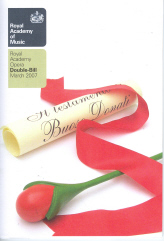
Tchaikovsky - Iolanta
King Rene – Piotr Lempa / Kong-Seok Choi
Robert – Dong Jun Wang / Christopher Tonkin
Count Vaudemont – Allan Clayton / Andrew Goodwin
Ebn-Hakia – Teit Kanstrup / David Butt Philip
Almeric – Richard Rowe / Christopher Diffey
Bertrand – Ross McInoy / Hyung Tae Kim
Iolanta – Julia Sporsen / Maria Matyazova
Martha – Catherine Hopper / Emma Carrington
Brigitte – Narine Ojakhyan / Katherine Crotty
Laura – Anna Graca / Lucie Spickova
Puccini – Gianni Schicchi
Schicchi – Thorbjorn Gulbrandsoy / George von Bergen
Lauretta – Claire Watkins / Lisa Crosato
Zita – Kristen Darregh / Catherine Hopper
Rinuccio – Xing-Wa Hao / Anders Annerholm
Gherardo – Christopher Diffey / Richard Rowe
Nella – Emma Jayakumar / Narine Ojakhyan
Betto – David Butt Philip / Emilien Hamel
Simone – Hyung Tae Kim / Piotr Lempa
Marco – Christopher Tonkin / Teit Kanstrup
La Ciesca – Lan Wei / Anna Graca
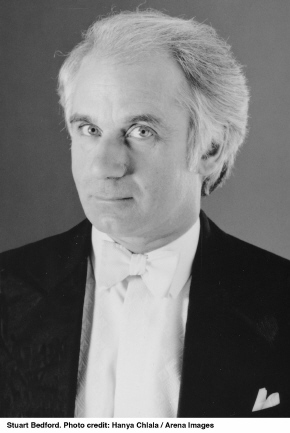 Conductor – Steuart Bedford Conductor – Steuart Bedford
Director – Orpha Phelan
Designer – Leslie Travers
Lighting – Paul Taylor
Royal Academy Opera's matched pair of Tchaikovsky and Puccini one-acters was a great success, underpinned, under Steuart Bedford's direction, by some of the best and most idiomatic romantic orchestral playing I have heard in student opera.
Iolanta's first scene is one of the most beautiful in all Tchaikovsky, and the story as it unfolded was graced with some fine singing by a cast (one of two) directed tastefully by Orlan Phelan.
This month, RAM had the upper hand over the usually excellent GSMD, whose Figaro was sadly misconceived. They had mounted an unforgettable poetic Iolanta in 2001 but, so far as memory can be trusted, the RAM singing and orchestral playing was better this time round.
Super-titles, not yet ubiquitous in 2001, made the metaphorical tale of probable paternal abuse, with denial characterised as 'blindness', comprehensible in modern terms - (the screen was too high above the stage for the front rows).
RAM’s choice of combination provides an interesting synergy. Both operas featured a daughter 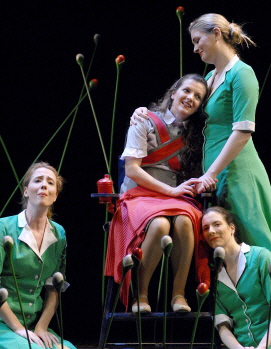 and a father. The Princess Iolanta's over-solicitous and sinister father controls his blind daughter’s environment, and in Schicchi the pretty daughter coaxes her father into the plot, achieving her own 'happy ending'. and a father. The Princess Iolanta's over-solicitous and sinister father controls his blind daughter’s environment, and in Schicchi the pretty daughter coaxes her father into the plot, achieving her own 'happy ending'.
The prison within which Iolanta, with three 'nurses', was 'protected' from the wicked world outside was depicted by Leslie Travers as surrounded by a ring of flowers, and she was eventually 'cured' by psychological intervention...
Leslie Travers’ designs use lengths of scarlet ribbon as a visual link between the two pieces. They form a warning “keep out” barrier to the circular magic garden in which Iolanta is virtually imprisoned, and repeated on her costume, as though physically restraining her.
Orpha Phelan’s direction allowed the fairy tale nature of the story to unfold quite simply, though a deeper reading was there for the seeking; it is Tchaikovsky’s lyrical music that really makes this opera such a jewel.
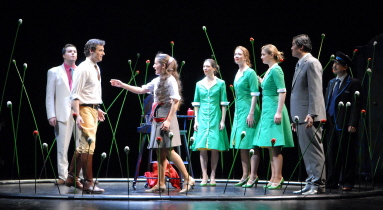
Gianni Schicchi
After the interval red ribbons were again in evidence as wall hangings in Buoso Donati’s rather shambolic villa. Careful costuming and direction made sense of his complicated extended family.
Gianni Schicchi, an ensemble opera above all else, was given in a surreal production, also by Orpha Phelan, who doubled as choreographer.
She avoided the excesses which undermined Figaro at the Academy's easterly neighbour. The 'grieving' family members were carefully characterised and moved around smoothly in complicated patterns, but without jeopardising their ability to make their marks as singers.
Singers
Both operas involve a large number of roles and it is a real tribute to the strength of RAM’s Opera Course that they were able to double cast throughout.
The two Iolantas, Julia Sporsen and Maria Matyazova, gave vulnerable looking portrayals of the blind princess, and the part suited their voices well. Invidious to name names amongst so many; in the first cast the trio of Allan Clayton (Count Vaudemont), Piotr Lempa (King René) and Dong Jun Wang (Robert) produced singing of the very highest standard, and in the second Christopher Tonkin (Robert) and David Butt Philip (Ebn-Hakia) distinguished themselves.
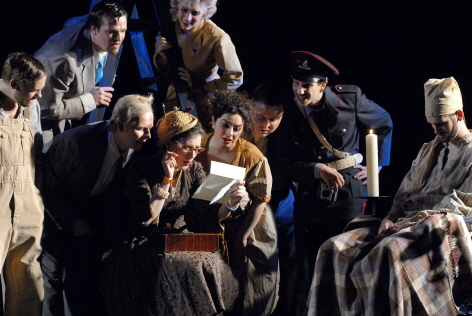 In Gianni Schicchi the title role was likewise well taken in both casts. George von Bergen has the stronger voice, but Thorbjorn Gulbrandsoy the better comic timing. Lisa Crusato (Lauretta) extracted every ounce of magic from O mio babbino caro as did Xing-Wa Hao (Rinuccio) from Firenze è come un albero fiorito. Notable cameos came from Richard Rowe (Gherado) and Emilien Hamel (Betto), and the ebullient youngster Harry Forster came near to stealing the show as the child Gherardino. In Gianni Schicchi the title role was likewise well taken in both casts. George von Bergen has the stronger voice, but Thorbjorn Gulbrandsoy the better comic timing. Lisa Crusato (Lauretta) extracted every ounce of magic from O mio babbino caro as did Xing-Wa Hao (Rinuccio) from Firenze è come un albero fiorito. Notable cameos came from Richard Rowe (Gherado) and Emilien Hamel (Betto), and the ebullient youngster Harry Forster came near to stealing the show as the child Gherardino.
Serena Fenwick and Peter Grahame Woolf
Photo credits Chris Christodoulou.
|



